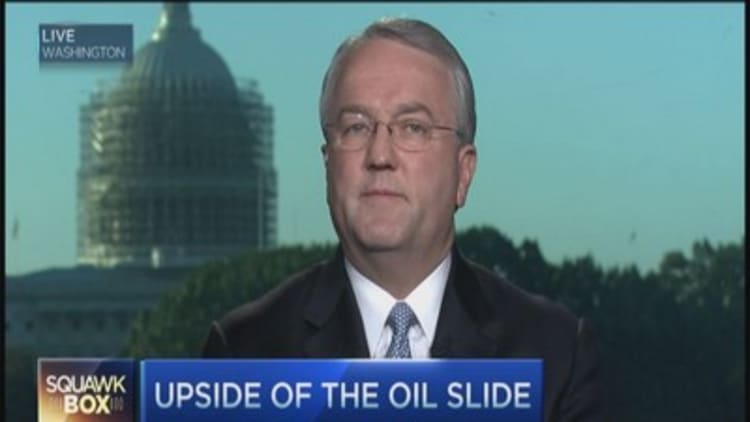
Oil prices might have halted their earlier slide below $80 a barrel this week but analysts believe the dog fight between major oil producers over reducing the supply of oil could lead to lower prices yet.
Oil markets have seen prices fall sharply over the last four months, as faltering global growth in major economies has cut demand at a time of over-supply. On Thursday, WTI crude fell below $80 a barrel for the first time since June 2012 before recovering to 82.88 on Friday.
The global oil benchmark Brent crude climbed by almost a dollar to near $86 a barrel on Friday morning -- up from a near four-year low at below $83 on Thursday -- after more positive economic data from the U.S. Prices have fallen over 20 percent since June, however, when turmoil in Iraq lifted prices to $116 a barrel.
"The bearishness in the global oil market is all being driven by the U.S. shale revolution," Seth Kleinman, head of Global Energy Strategy at Citi, told CNBC. "It's being driven by this massive infrastructure build out that we've seen over the last few years and it's taken the market a lot more time to catch up and act more rationally."
The U.S. shale gas industry has boomed over the last decade with shale gas and oil producers proliferating and production surging in the country, becoming a competitor for major oil-exporting countries such as Saudi Arabia.
The drop in oil prices has led to expectations that the Organization of the Petroleum Exporting Countries (OPEC) could cut output in an attempt to shore up prices, but OPEC members Saudi Arabia and Kuwait played down such a move at the start of the week. That could pile pressure on the U.S. shale industry and its producers to cut supply themselves if and when prices decline further.
"Everyone was assuming that the Saudis were going to pull back and defend prices," Kleinman told CNBC Europe's "Squawk Box" on Friday.
"They probably could have defended $100 but they sent the message loudly, clearly and by every venue possible of 'we're not going to defend prices here.' In fact, they started slashing prices to Asia."
Whilst markets try to divine Saudi Arabia's reasons for refusing to cut supply, Kleinman said it was plausible that it was trying to pressure its rival oil producer Iran or was trying "to have a price war with the U.S. shale producers -- because they know they can win it."
Read more: This price would kill U.S. oil production growth
This could mean the major oil producer is entering a risky price war with the States, however, Kleinman warned. "I think they're overestimating the level at which they'll win it and the amount of pain they'll suffer in the process. The Saudis have been very vocal saying that $90 (per barrel) is the floor, well, we're sub-$90 now."

Despite OPEC's refusal to cut supply and potentially concede market share to competitors, Kleinman believed that the U.S. shale industry was not yet at risk from current price declines, however. Oil prices would need to get closer to $50 to $60 a barrel, he said, to really "do damage and I don't think they [Saudi Arabia] could sustain that for that long."
Read more:
"We're at the point now where [the decline in oil prices] is inflicting some pain, you can see it in the equity markets, but it's not enough to derail the U.S. shale story at current price levels, not even really close."
On Thursday, the International Energy Agency's chief analyst Antoine Halff said that OPEC may no longer necessarily play its traditional role of "swing producer" in the oil market – a swing producer is one that can cut or increase supply and thus influence or balance market prices.
Goldman Sachs' global macro research team said in a note on Thursday that "U.S. shale is the marginal swing barrel in the new oil order" and that "Game theory (the study of strategic decision-making) suggests that Saudi Arabia should no longer be the sole first mover swing barrel, as shale is extremely scalable both to the up and downside."
Read more: How the US shale boom will be felt around the world
Goldman's note also suggested that the oil price decline was "too much too soon" mostly driven "by positioning based upon expected fundamental shifts as opposed to currently observable shifts… This leaves us near-term constructive despite being bearish as we look further out." It added that the "supply glut" was not yet manifest.
"Should the glut [in supply] materialize to the extreme expected, we believe the shale barrel will need to balance the market, which would suggest WTI prices sub-$80/bbl for a period of time to create an adjustment in supply," Goldman noted.
Read more: Oil demand to 'rise tentatively' in 2015: IEA
"While looking into 2015 we have sympathy for these medium- to longer-term bearish views that have driven prices lower, we believe it is too much too early. Prices have also likely overshot to the downside," the note added. Citi's Kleinman agreed that prices would recover. "Oil has had a big selloff, it's continuing to look over-supplied but it's come off a long way. Everyone's short but I think if we don't have a macro meltdown here then I think oil is actually going to be ok at these levels."


